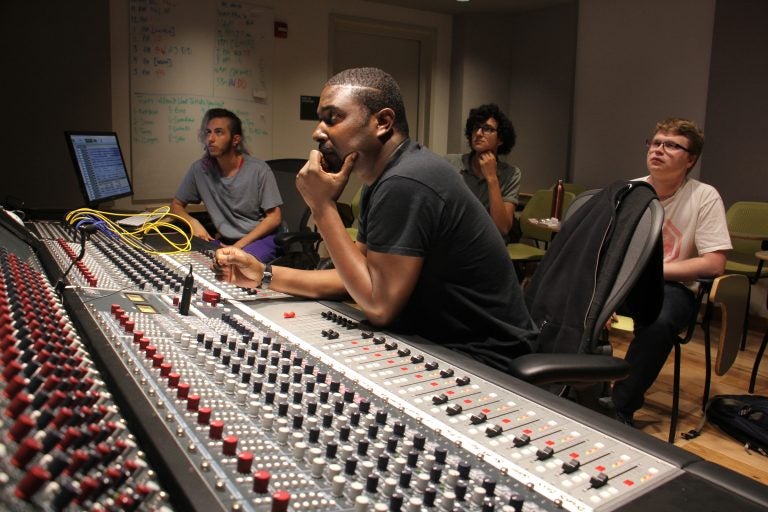Soul searching: Reggae artist finds goldmine in Drexel’s Philly Sound archive
A music recording archive at Drexel University is feeding a reggae songwriter based in London.
Listen 5:08
British musician Bitty McLean (center) works with Drexel students to remix tracks from the school's Sigma Sound archives. (Emma Lee/WHYY)
British reggae musician Bitty McLean is in Philadelphia this week, at Drexel University transforming an archive of forgotten Philly funk, and rhythm and blues recordings into Jamaican dub.
In the 1970s, the Sigma Sound Studio in Philadelphia was legendary for shaping the Philly Sound — lushly arranged funk and R&B for which the city was famous. When the founder of Sigma sold the studio in 2003, many of the tapes were donated to Drexel University, which discovered a trove of multi-track tapes that had never been mixed or released.
Now, McLean is panning those 40-year-old tapes to find reggae gold.
“The influence of soul music on Jamaican music is vast,” said McLean. “There’s not a singer from the vintage era that would not identify Lou Rawls, Marvin Gaye, Nat King Cole.”
For decades, McLean has worked with Sly & Robbie, the highly prolific and influential Jamaican music producers and architects of dub. He said they are deep into the Philly Sound.
“You talk to Sly Dunbar, and he’ll talk about Earl Young and the way he tuned his drums,” said McLean, referring to the drummer from The Trammps and countless sessions for Philadelphia International Records. “He turns into a little kid.”
Reggae artists might take influence from American R&B, but it’s rare to work directly with those old recordings. Most Jamaican dub pulls rhythm tracks from old reggae sessions, not the Philadelphia Sound.
In Drexel University’s newly built music recording studio, McLean worked with students to remix the Sigma tracks and record his own songs on top of them. For some students, it was their first time in a professional studio session.
“It can be a bit of a shock, how sessions run,” he said. “We haven’t got time for gossiping. The artist is paying for the studio. The workflow has to move fast.”
From London to Drexel
McLean started in the business as a student when he got a gig working behind the board for UB40 in the 1980s, just as the band was breaking out. He went on to have a handful of reggae hits of his own, including covers of “Dedicated to the One I Love” and Fats Domino’s “It Keeps Raining.”
Based in London, he hooked up with Drexel through the label Reservoir Records, which bought the licensing rights to the Philly Groove Records catalog, including some recording sessions from Sigma that were never released. The label invited McLean to dig tracks at the Drexel archive, to find material for new songs.
Some of the recordings are incomplete because the original artist may not have put down a vocal track, or the instrument tracks may never have been mixed.
“You push up a drum track, and it’s one track of drums,” said McLean. In modern music recordings, with nearly infinite digital tracks, drums are typically recorded with each drum element in its own track.
“The whole song was six tracks: drums, bass, guitar, horns, strings, and piano and vocals on the same track,” he said. “You could hear all the spillage — the piano on the drum track and drums on the piano track. That’s the chemistry of these recordings.”
McLean asked Toby Seay, director of the Drexel music archives, to strip out everything but the drums and bass, then send those rhythm tracks to him as MP3s. While writing new songs, he wanted as little information as possible: no vocal tracks, no song lyrics, no string arrangements nor guitar melodies. He didn’t even want to know the name of the original artist, for fear it would sway his own creativity.
One of the tracks Seay sent was the rhythm sections of “I Need Your Love So Bad,” originally performed by Billy Bass and released as a single in 1968. It’s a song known to only the most ardent vinyl 45 collectors, something McLean is not likely to have heard previously.
He pulled out Bass’ voice, and laid his own song over the Philly Sound.
“I love writing love songs. That’s just naturally me,” he said. “That’s not to say I write songs, like, ‘Baby I Love You.’ It could be about breaking up, cheating, begging for one more chance. It’s complex, there are so many different elements and dimensions.”
Respecting the music
He often rearranges the song, moving string parts to another verse, for example, or lifting a guitar line for an accent.
But he has a rule — no overdubs. McLean limits himself to material that’s already on the tape.
“It would take away the essence if you throw overdubs on top,” he said. “It’s showing the music respect. Showing respect to what was laid down.”
After he finished one song, which he is calling “The Feeling’s So Real,” he was shocked to learn he had copped tracks from The Delphonics’ “I Don’t Want to Make You Wait,” released in 1974 on their final album, “Alive and Kicking.”
With the Delphonics, McLean realized he was tampering with sacred ground.
“It’s the hardest project I’ve been involved in,” he said. “The expectations. Especially with the Delphonics. Oh my goodness. I’m setting myself up now. I’m a target.”
If it was easy, somebody else would have already done it.
“To be in a comfort zone is the worst, for an artist,” said McLean. “I’m in my comfort zone in terms of the music I love — soul music, reggae, jazz, rhythm and blues. But in terms of songwriting, every song is a challenge.”
After two weeks working in the studio with Drexel students, McLean will return home to London to finished the job. He expects to have 12 songs ready for release next year.
WHYY is your source for fact-based, in-depth journalism and information. As a nonprofit organization, we rely on financial support from readers like you. Please give today.





